External Collaborative Partnerships
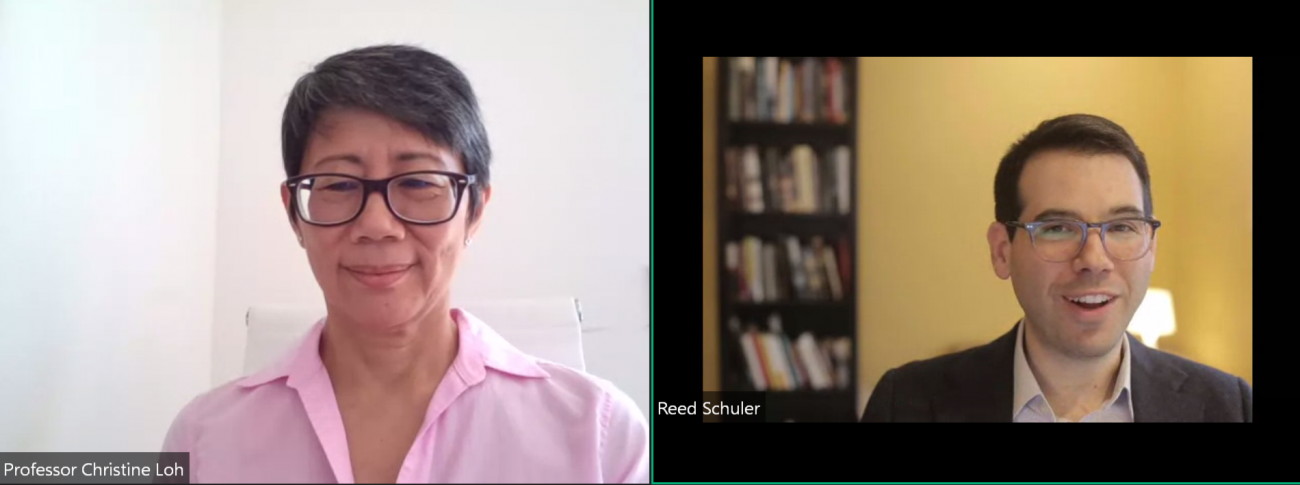
Assessing President Biden’s Climate Policy: A Conversation with Reed Schuler, Senior Advisor to Special Presidential Envoy for Climate John Kerry
August 2021
Tackling climate change was one of Joe Biden’s key campaign promises. President Biden took office with an ambitious climate plan that lies at the center of his domestic and foreign policies. Committed to putting the climate crisis at the center of his policy agenda, President Biden appointed John Kerry, the inaugural first-ever Special Presidential Envoy for Climate, whose job is to lead the president’s international climate agenda and engagement. The U.S. has pledged that by 2030, it would cut greenhouse gases by 50% compared to 2005 levels; that there would be a carbon free power sector by 2035; and the U.S. would achieve Net Zero by 2050. As the climate crisis continues to escalate — this summer is one of the hottest on record, with severe droughts and wildfires, and flooding across the globe.
On August 25, Reed Schuler, senior advisor to Special Presidential Envoy for Climate John Kerry shared how the Biden administration is tackling climate change both domestically and internationally. Before joining the Biden-Harris Administration, Schuler was Washington State Governor Jay Inslee’s senior policy advisor for climate and sustainability and the Governor's special advisor for Pandemic Health Response. The lunchtime conversation, attended by Anderson students and alumni, was moderated by with Christine Loh, UCLA Anderson visiting professor, former Under Secretary for the Environment in Hong Kong (2012-17) and chief development strategist at the Hong Kong University of Science and Technology’s Institute of the Environment. The conversation took an inside look at the inaugural Special Envoy’s office, unpacked the goals of Biden’s climate policy and addressed how the administration aims to work with the global community to address the complex, pressing issue of climate change. This November, Kerry will lead a U.S. delegation to Glasgow, where the world will meet for a critical summit, the 2021 United Nations Climate Change Conference, also known as COP26 (the 26th UN Climate Change conference). Schuler shared insights on what Kerry hopes to achieve at COP26 and in this critical year, and what the world must do to accelerate its fight against climate change. The event was hosted by the Los Angeles World Affairs Council & Town Hall, in partnership with the Center for Global Management. The Center for Global Management is a member of the LAWAC & Town Hall. VIEW VIDEO
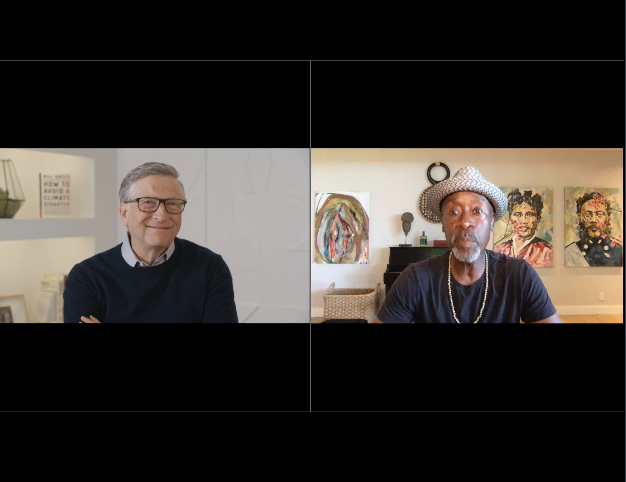
How to Avoid A Climate Disaster: The Solutions We Have and the Breakthroughs We Need
February 2021
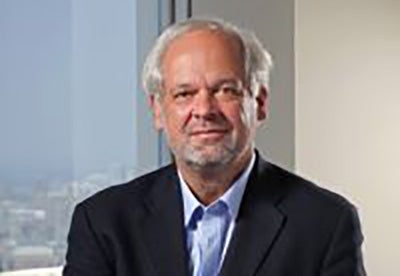
How Technology Transforms Our Ethics
January 2021
In his new book Right/Wrong: How Technology Transforms Our Ethics, author, academic and futurist Juan Enriquez argues that technology not only shapes people’s ethics but also has drastically improved ethics within societies. This argument challenges many widely held beliefs that technology corrupts societal ethics. Enriquez further posits that today’s most pressing issues — the pandemic, climate change, and political polarization to name a few — are all shaped by the relationship between technology and ethics, and that this holds enormous potential for improving the future. What can we learn from past technological innovations and how can we use this knowledge to build a better future? The conversation with Enriquez that attracted an audience of over 400, included many UCLA Anderson MBA students and alumni, was moderated by UCLA Anderson’s Professor Terry Kramer and traced the historical foundations of the book’s arguments and parsed out how understanding the relationship between technology and ethics can help us solve today’s diverse problems. Questions touched on many fascinating topics including how ethics evolves over time and are not static; how technology has played an important role in raising awareness and greater transparency; misinformation; and the importance of leadership, accountability and focusing on the facts for decision-making. Enriquez possessed a distinct and very impressive ability to take disparate facts about the world around us and make sense of them in a way that is timely and relevant. In closing, Enriquez emphasized the importance of humility and forgiveness in judging each other and judging the past and that ethics is not something to be scared of. Juan Enriquez is a leading authority on the economic impact of life sciences and brain research on business and society as well as an entrepreneur. He was the founding director of the Harvard Business School's Life Sciences Project and is a research affiliate at MIT’s synthetic neurobiology lab. Following HBS, Enriquez became an active angel investor. He then co-founded Excel Venture Management. As a business leader, advisor, and renowned speaker, he works directly with the CEOs of a number of Fortune 50 companies, as well as various heads of state, on how to adapt to a world where the dominant language is shifting from the digital towards the language of life. Enriquez is author and co-author of multiple bestsellers including As the Future Catches You: How Genomics Will Change Your Life, Work, Health, and Wealth (1999), The United States of America: Polarization, Fracturing and Our Future (2005), Evolving Ourselves: Redesigning Humanity One Gene at a Time (2015). He is a TED All-Star with nine TED talks on a variety of subjects, as well as dozens of TEDx talks. Enriquez also serves on multiple for profit boards as well as a variety of non-profits. The event was hosted by and in collaboration with the Los Angeles World Affairs Council & Town Hall, in partnership with the Center for Global Management and Easton Technology Management Center. The Center for Global Management is a member of the LAWAC & Town Hall. VIEW VIDEO
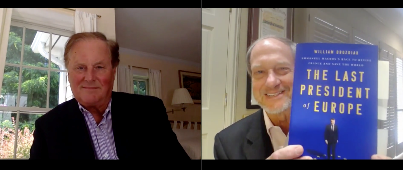
A Bastille Day Discussion on Emmanuel Macron, France, and Europe’s Place in the World
July 2020
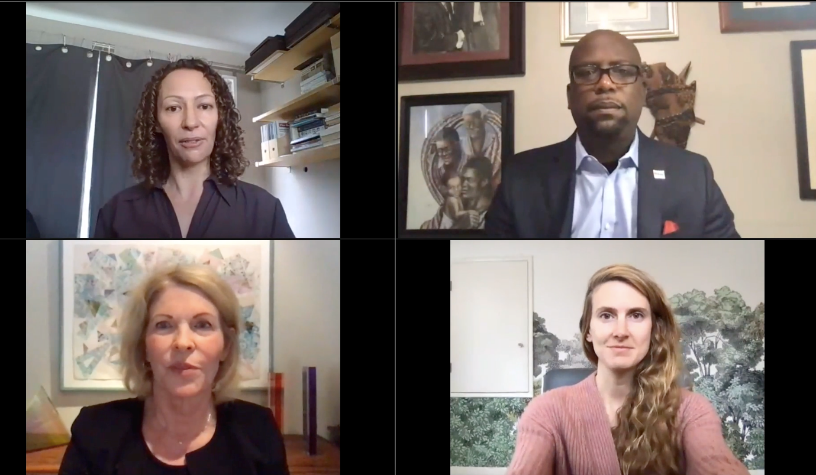
Crisis Leadership: The Road to Recovery
July 2020
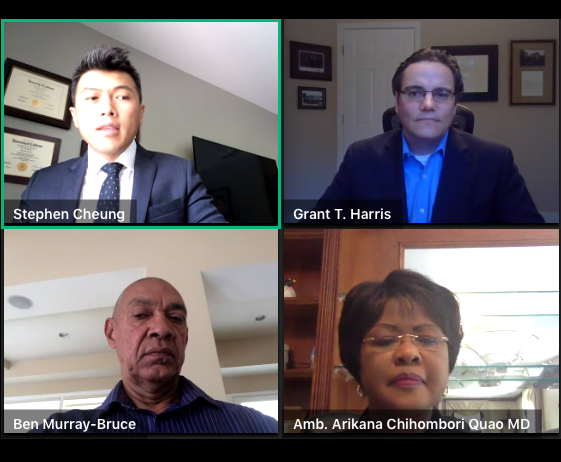
The Institutional and Global Origins of Inequality on the African Continent
June 2020
As many Americans have been grappling with racism, police brutality and systemic inequality domestically, later in June, students and faculty tuned in for a virtual panel discussion that discussed racism and racial inequality globally, specifically in African nations. Moderated by UCLA alumnus Stephen Cheung (B.S. ’00, MSW ’07), president of the World Trade Center Los Angeles, panelists discussed the unfair treatment of African nations by corporations and international institutions. Unequal health outcomes in many African nations during the COVID-19 pandemic, due to the unequal global allocation of health resources, is just one pressing example of present-day anti-blackness and the legacy of colonialism. The discussion focused on historic and contemporary examples of institutionalized racism toward the continent of Africa within global economic structures and business practices, as these are key modern drivers of anti-black racism and oppression. Arikana Chihombori Quao, African Union ambassador to the U.S. (2016–2019); Ben Murray-Bruce, former Nigerian senator (2015–2019) and founder of the Silverbird Group; and Grant Harris, CEO of Harris Africa Partners and former senior director for African affairs at the White House, joined the conversation.
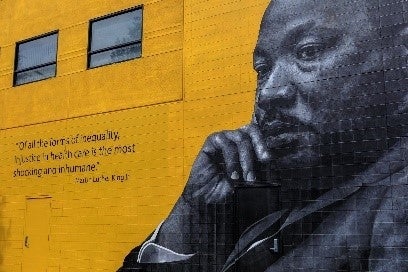
Confronting Racism: A Pandemic Within a Pandemic
June 2020
In the aftermath of the murder of George Floyd by a police officer in Minneapolis, this moment in the United States has been described as, “a pandemic within a pandemic.” In June, students listened to a livestreamed conversation with Los Angeles leaders, who addressed the current national conversation on racism, police brutality and criminal justice reform. They also examined COVID-19’s disproportionate impact on minorities and their communities, and touched on the medical, economic and cultural impact of the COVID-19 crisis — as the pandemic and subsequent shutdown exposed and reinforced issues of racial and ethnic inequality, discrimination and barriers to health care and economic success.
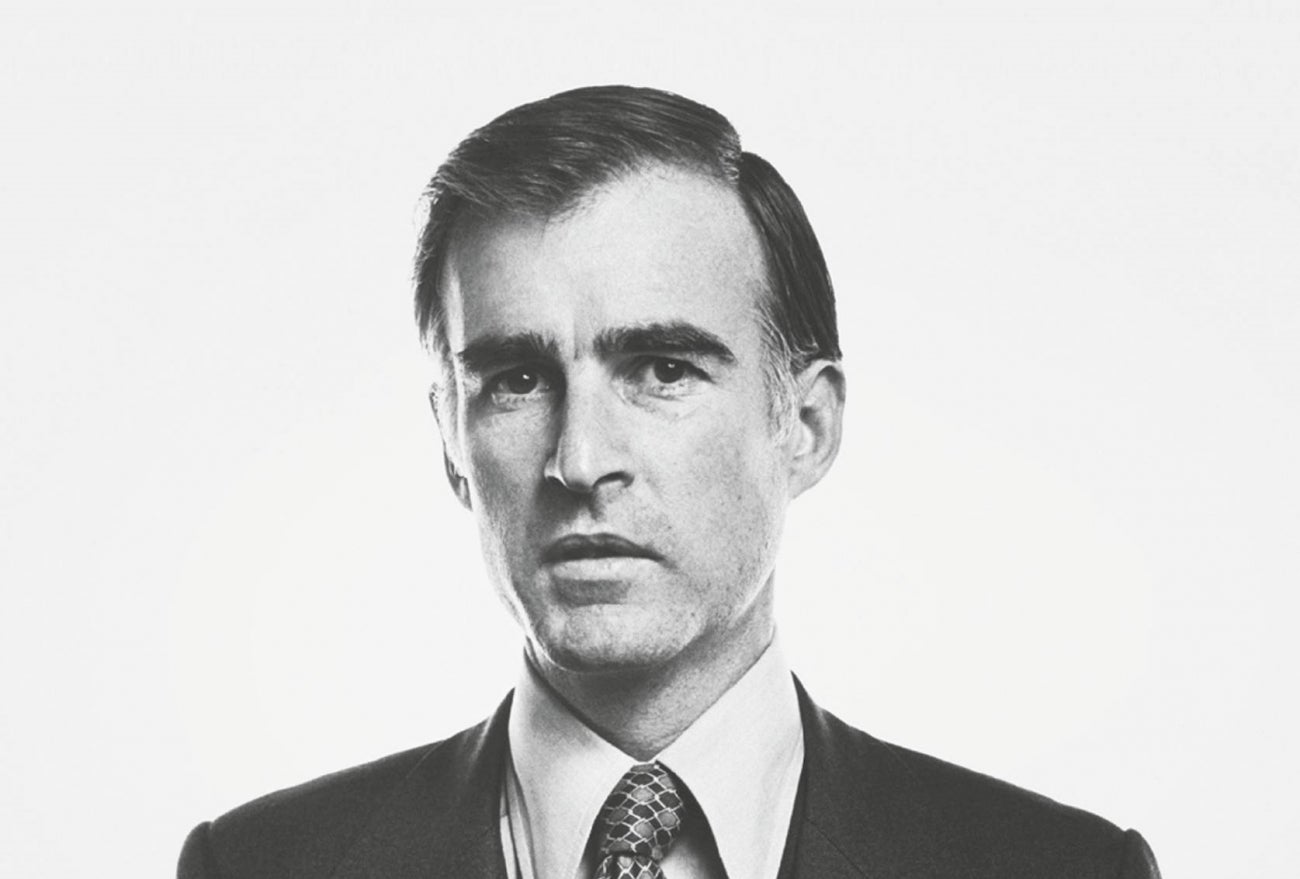
Man of Tomorrow: The Relentless Life of Jerry Brown
May 2020
In May, students joined virtually to hear author Jim Newton and Jerry Brown, former governor of California, for a discussion of his political career and a commentary on protecting the nation’s health and reestablishing its economy during the COVID-19 pandemic. Governor Brown also addressed his time governing California, what he learned and what he wished he could have done differently, and he provided advice for U.S. governors now facing the toughest decisions of their political careers. In his new book, Man of Tomorrow: The Relentless Life of Jerry Brown, award-winning journalist Newton reveals the complex and often contradictory nature of Brown’s personality and politics — and how Brown’s leadership stood up to the Trump White House’s policies on climate change, immigration and more. The book also explores the unconventional arc of Brown’s career. In addition to being the longest-serving governor in California history, Brown was a three-time presidential candidate, a two-term mayor of Oakland and the California attorney general.
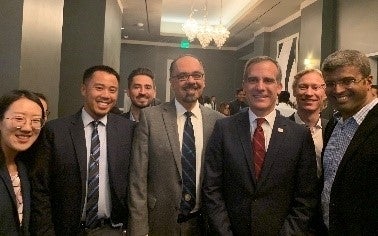
Los Angeles: The Global City
October 2019
Students from the full-time MBA, FEMBA and EMBA programs had the opportunity to meet and hear from Los Angeles Mayor Eric Garcetti. He joined Terry McCarthy, former president of the Los Angeles World Affairs Council, for a moderated discussion on Los Angeles as a premier global city and international gateway for the 2028 Summer Olympics. Garcetti described the benchmarks for a safe, livable and prosperous global city, as well as the role that climate change plays. He also addressed the homelessness issue in the city and the importance of housing, infrastructure and transportation.
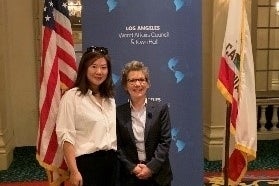
The Value of an Inclusive Economy
October 2019
Students attended a lunchtime discussion hosted by the LAWACTH with Mary C. Daly, president and CEO of the Federal Reserve Bank of San Francisco. Daly addressed the value of an inclusive economy, from rural populations with limited job opportunities to lower-income Americans struggling to access education. She discussed the value of having these communities more fully participating in our economy and why inclusive success is essential to America’s future economic competitiveness.
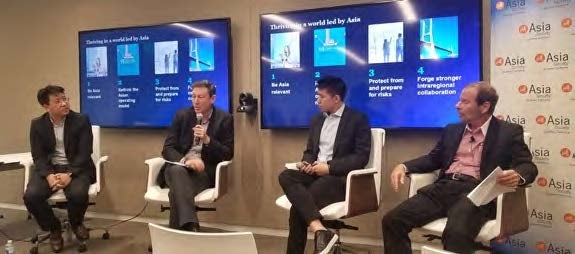
Asia’s Future is Now
October 2019
For years, Western observers and media have been talking about the rise of Asia in terms of its massive potential. But the time has come for the rest of the world to update its thinking. The question is no longer how quickly the region will rise; it is how Asia will lead. The CGM supported students from the full-time MBA, FEMBA and EMBA programs to attend a discussion and hear expert perspectives on the Asian Century and how Asia, more than any other region of the world, will shape the next phase of globalization. The discussion featured Jeongmin Seong (pictured, far left), senior fellow at the McKinsey Global Institute, who shared insights from McKinsey’s research series on the future of Asia and deciphered the region’s many facets, from trade flows and the corporate ecosystem to technology and the Asian consumer.
Walter Wang (second from right), head of, head of operations at TSM, and Terry Kramer, adjunct professor and faculty director of UCLA Anderson’s Easton Technology Management Center, joined the conversation that also addressed how business leaders can better develop new strategies and thrive in the Asian Century. The discussion was moderated by Ira Kasoff, a board member of the Asia Society Southern California.
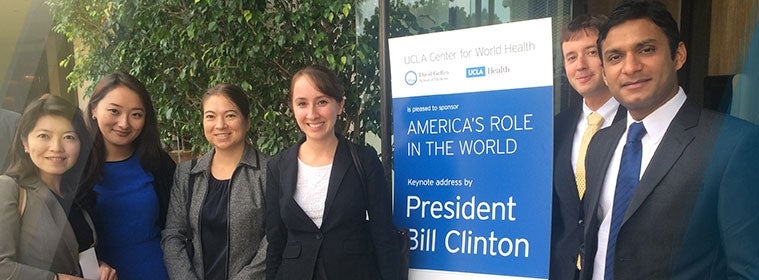
Social Media's Dark Side – A Conversation with Roger McNamee
October 2021
Roger McNamee, an American businessman, Silicon Valley investor, and venture capitalist was an early investor in Facebook and personal mentor to Mark Zuckerberg, but since 2017 he has been working to trigger a national conversation about the dangers of unregulated technology giants like Facebook. McNamee’s 2019 New York Times bestselling book, Zucked: Waking Up to the Facebook Catastrophe, details his realization of Facebook’s dangerous business and his reckoning with how we as a society must work towards change. Fast forward to 2021 – Facebook, as the world’s largest social media platform, is under scrutiny for its alleged role in fake news, promoting hate, extremism, cyberbullying, human trafficking and anti-trust violations and McNamee’s work came back into the public spotlight this month, after Facebook whistleblower Frances Haugen’s explosive testimony before Congress.
On October 21, the Los Angeles World Affairs Council & Town Hall and UCLA Anderson School of Management co-hosted a timely conversation with Roger McNamee on Social Media’s Dark Side. McNamee addressed the impact of disruptive innovation on products, services, markets and competition in the U.S. and globally and shared his views about the trade-offs and implications of actions, and how to mitigate any unintended consequences while achieving necessary reforms. The conversation suggested that self-regulation is not enough, business models and cultures are key drivers of outcomes, and there is a path to better behavior. It is important to think about various stakeholders and stakeholder management, including employees, customers as well as the community and society; and while there is an epic battle between efficiency and democracy, we shouldn’t lose sight of the importance of democracy that as created such great outcomes. The discussion was moderated by UCLA Anderson’s Professor Terry Kramer who teaches a number of tech-focused global management elective courses. The event was hosted by the Los Angeles World Affairs Council & Town Hall, in partnership with UCLA Anderson School of Management. The Center for Global Management is a member of the LAWAC & Town Hall. VIEW VIDEO